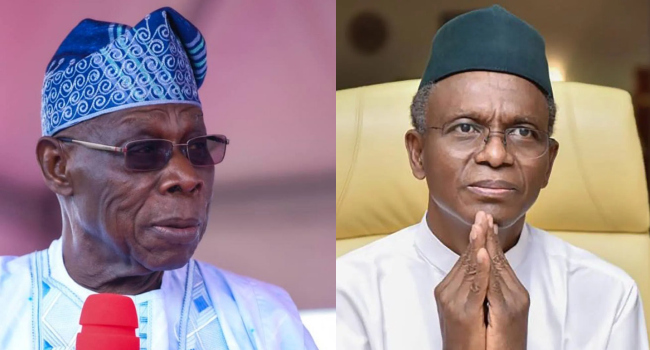Former President Olusegun Obasanjo has disclosed that he rejected a proposal to make Nasir El-Rufai, then Minister of the Federal Capital Territory, his successor at the end of his administration in 2007, citing concerns about El-Rufai’s readiness to lead Nigeria.
Obasanjo revealed this on Friday during the second edition of the Ajibosin Platform Annual Symposium in Abeokuta, Ogun State. The former president explained that although El-Rufai had served under him as Director-General of the Bureau of Public Enterprises (BPE) and later as Minister of the FCT, he believed the minister “was not yet mature enough” to handle the complexities of governing the country.
The disclosure came as Obasanjo responded to a keynote speech by former Minister of Aviation, Osita Chidoka, who recounted how El-Rufai had introduced him to Obasanjo at age 34, leading to his appointment as Corps Marshal of the Federal Road Safety Corps (FRSC).
Obasanjo, smiling, told the audience: “When I was leaving government, he [Chidoka] was pushing that his friend, El-Rufai, should be brought in as my successor. I did not yield to the pressure. Later, after seeing his performance, he came back to me and said, ‘You were absolutely correct — El-Rufai needed to mature.’”
Despite this, the former president praised both men and other members of his administration, describing them as “individuals with special attributes” who contributed significantly to the success of his government from 1999 to 2007.
On leadership, Obasanjo stressed the importance of character, exposure, experience, and training. “It’s only in politics that I found out there is no training for leadership. Even among armed robbers, I was told there is apprenticeship. But in politics, there’s no training for leadership. That’s not good enough,” he said.
In his keynote address, Chidoka emphasized that Nigeria’s challenges stem not from a lack of ideas, but from weak systems and institutions. “Leadership finds its true measure not in speeches or charisma, but in the systems it leaves behind. Moral conviction must translate into the everyday machinery of governance — rules, routines, and institutions that make competence predictable and corruption difficult,” he said.
Chidoka called for stronger frameworks to track government performance through measurable outcomes, arguing that “Nigeria’s problem has never been the absence of ideas; it is the absence of systems strong enough to outlive their authors.”
The symposium, attended by political leaders, scholars, and civic advocates, focused on the theme: “Leadership, Governance, and Institutional Renewal in Nigeria.”



